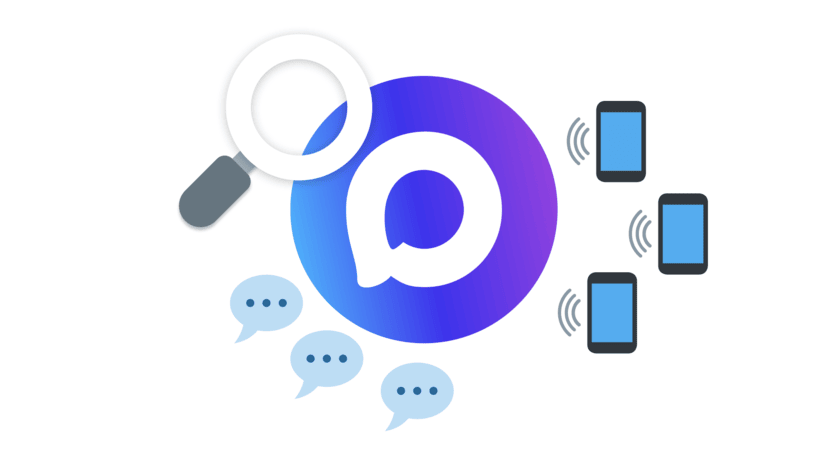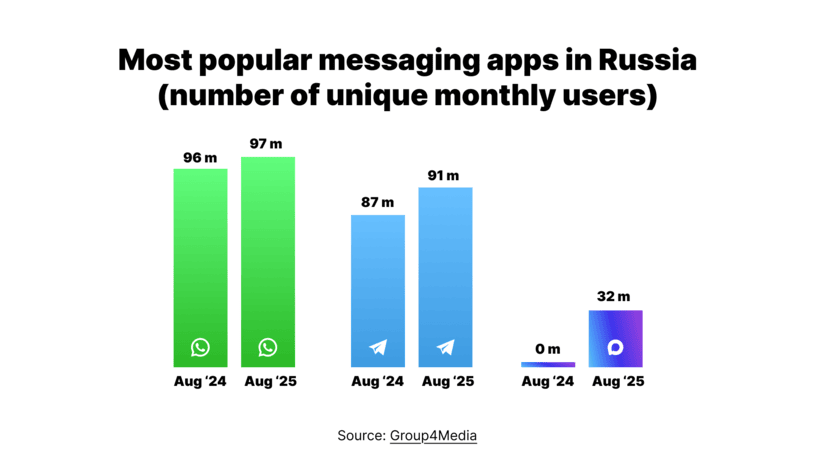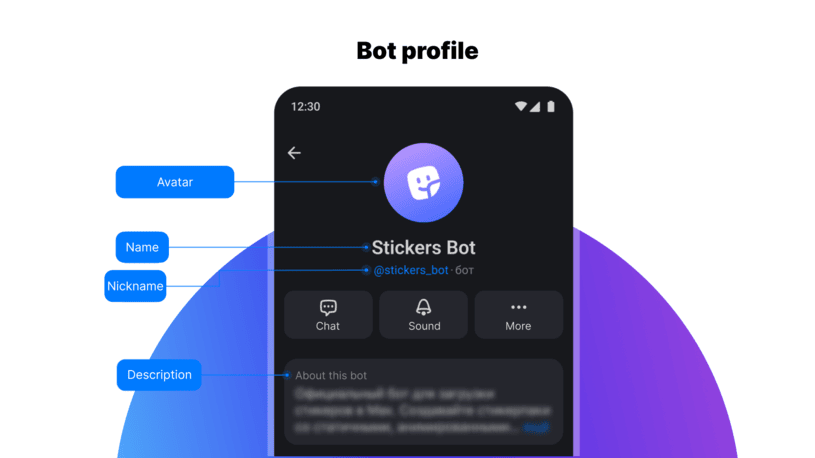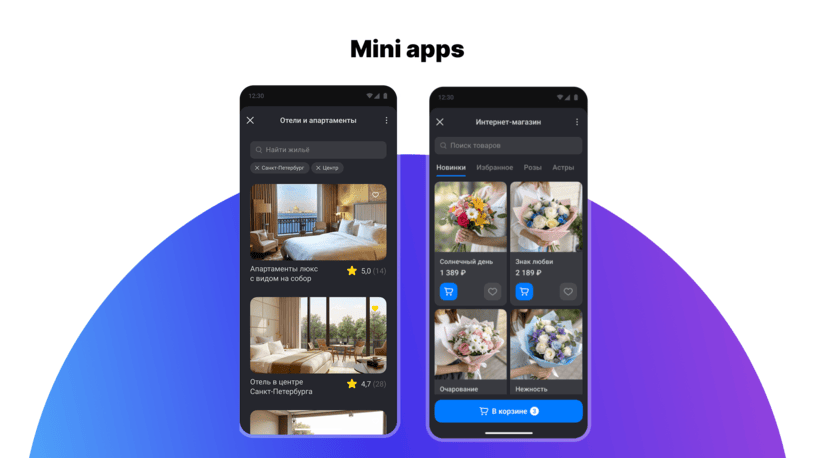MAX: Russia’s New National Messaging Super App Explained
Taking a closer look at the emerging digital communication channel.

MAX messaging app is a prime example of how in the constantly evolving landscape of digital communication, new players emerge both through market competition and strategic state-backed initiatives. The project represents a significant effort in the field of digital sovereignty and is rapidly becoming a cornerstone of Russia's domestic digital communication.
For international businesses, understanding MAX is no longer optional — it is essential for effective communication within the Russian market. In the article, we will explore what MAX messenger is, its "super app" ambitions, the privacy debate surrounding it, and how businesses can seamlessly integrate it into their customer communication workflows.
Table of contents:
What is MAX messenger?
MAX messaging app is a personal and official communication hub, closely integrated with Russian governmental digital services. VK Group, the tech corporation behind Russia’s top social network VKontakte, launched MAX initially as a secure internal messaging tool for government officials and employees of state-owned corporations. Since then, the app’s role has expanded significantly as it aims to become one of the top-3 major messaging apps in Russia.

The Kremlin’s WhatsApp alternative now on every Russian phone
The Russian government is promoting MAX it for public adoption as part of its effort to build a unified, homegrown digital ecosystem.
The move highlights the state’s desire to limit dependence on foreign platforms like WhatsApp and Telegram, as well as strengthen national control over communications and self-sufficiency in the digital area.
The most significant driver for MAX's adoption is a Russian law mandating the pre-installation of domestic software on all smartphones, tablets, and computers sold in the country. This means virtually every new device activated in Russia comes with MAX already on its home screen, giving it an unparalleled advantage in user acquisition.
This approach directly challenges the dominance of international messengers. In an environment where Western IT brands abandon the Russian market or encounter stringent regulations, the state actively promotes domestic substitutes for their digital products. MAX messenger is among them, being positioned as the default and officially approved option for digital communication, a strong Telegram and WhatsApp alternative.
What is the MAX app about?
Engineered to be more than a simple messenger, MAX messenger’s developers have ambition to make the app a Russian WeChat. The "super app" model, pioneered by the Chinese platform, combines chat, social media, payments, and public services into a single platform. The rich functionality of MAX reflects these aspirations:
- Core messaging features. Text and voice messages, group chats for up to several thousand members, video calls, stickers, and file sharing.
- Integration with state services. Users can link their MAX account to their official Gosuslugi (State Services) profile. This allows them to receive official notifications, schedule appointments, interact with government agencies, and access a wide range of services directly within the messenger.
- Tools for business. MAX offers dedicated features for corporate communication, including channels, bots and mini apps. More on this below.
- Future integrations. The app’s roadmap likely includes deeper integration with the broader VK ecosystem, which spans food delivery (Delivery Club), ride-hailing (Citymobil), e-commerce, and online payments (VK Pay).

MAX messenger for business
As well as a messaging app, MAX is positioned as a business communication and service platform. Companies can expect features for automation of sales, support, and even marketing efforts. Currently, setup and access are limited to a restricted list of legal entities, but we are likely to see a broader rollout in the near future.
Chatbots
- Automate customer interactions by handling routine tasks such as answering questions, scheduling tasks, or taking orders.
- They can be launched without programming skills using ready-made templates, or developers can code more advanced versions via the MAX Bot API to integrate with other systems.
- After moderation, these bots become accessible to MAX users, creating a direct and scalable channel for engagement.

Mini-apps
- Function like web-based apps and are easier to build than full mobile apps since they rely on familiar technologies such as HTML, JavaScript, and CSS.
- Allow companies to create lightweight, interactive services directly in the messenger.
- Can take on the role of online shops, booking systems, interactive forms, or even games.
- To achieve a consistent look and feel, developers can use the MAX UI component kit.
- Before going live, every mini-app must pass moderation and comply with Russian law as well as platform rules.

Businesses may combine these features, such as using a chatbot to make product suggestions and a mini-app to manage the checkout process. Beyond e-commerce, businesses may use bots for education, games, automatic reminders, and loyalty programs, as well as applications for order monitoring and marketing.
A super app or surveillance tool?
The state-backed nature of MAX messenger is at the heart of the debate surrounding it. VK Group and Russian authorities emphasize the utmost convenience. Having one app to handle communication, government contacts, and commercial transactions makes daily living easier. It promotes the development of the local IT sector and assures that user data is stored in Russia, which is portrayed as a question of national security and data protection. Users benefit greatly from the seamless connection with important services such as healthcare and tax websites.
Meanwhile, critics voice their concerns. Russian legislation compels telecom and internet service providers to preserve customer data and conversations for lengthy periods of time and offer access to them upon request from official bodies. Unlike services that advocate for end-to-end encryption by default, a messenger, which some call “WeChat clone”, strongly related to the state and integrated with official identification sites raises concerns about the genuine privacy of discussions.
How to install MAX messenger
The MAX messenger is available free on all major platforms, making it useful for both personal and business communication. You can download it on Android (Google Play, RuStore, Huawei AppGallery), iOS (App Store), Windows and macOS (from max.ru), or use the web version at web.max.ru.
The registration requires a Russian (+7) or Belarusian (+375) phone number. Foreign numbers are not supported currently. Enter your number, confirm the SMS code, and your account is created — no extra login or password needed. Adding contacts is simple: sync with your phonebook, use a link or QR code, or search by phone number.
What is the Russian alternative to WhatsApp?
In 2024 and earlier, Telegram, founded by Russian entrepreneur Pavel Durov, was immensely popular in Russia and often seen as an alternative. However, since MAX messenger's official release, it has become the official Russian alternative to WhatsApp.
- Telegram. Operates with a degree of perceived independence, though its relationship with Russian authorities has been complex. It is not officially integrated into the state's digital infrastructure.
- WhatsApp. Owned by Meta (designated an "extremist" organization in Russia), its future in the country is uncertain. While still widely used, the official push is to migrate users to domestic platforms.
- MAX Messenger. Actively promoted, pre-installed by law, and deeply embedded within the state's digital services ecosystem.
Umnico omnichannel messaging platform brings all your customer conversations together in one convenient dashboard, ensuring no customer inquiry gets missed. Instead of manually switching between apps, Umnico provides a single, organized hub to manage Telegram, WhatsApp and MAX chats efficiently, automate routine tasks and monitor employees’ performance.
Which messenger is the most private?
When comparing messenger privacy, true protection hinges on default end-to-end encryption, minimal data collection, and a corporate environment that prioritizes user rights. Signal stands out as the clear leader, with open-source protocols, universal default end-to-end encryption (E2EE), and virtually no metadata collection. WhatsApp also offers strong default E2EE, but its ownership by Meta means extensive metadata harvesting is built into the business model. Telegram uses E2EE in Secret Chats only, while the default cloud chats remain stored on company servers. MAX Messenger doesn’t promise E2E encryption in chats by default as well.
Frequently asked questions
Here we cover the essential aspect of MAX messenger in short.
What is the MAX app about?
MAX is a Russian messaging app for personal and business communication. It supports chats, media sharing, voice and video calls, and group conversations — an alternative to WhatsApp or Telegram.
What is the new Russian messenger app?
The new Russian messenger app is MAX, created as a local alternative to foreign services. It offers messaging, file sharing, and video calls, as well as extra features like bots and mini apps.
How to install MAX messenger on iPhone?
Open the App Store, search “MAX messaging app,” tap Download. Keep in mind that a Russian or Belarusian phone number is required for registration.
How to install MAX messenger on Android?
Go to the Google Play Store, type “MAX m,” tap Install and register with either a Russian or Belarusian phone number.
Summing things up
MAX messenger is a notable attempt to reshape how Russians communicate, blending private chats, government services, and business tools into a single “super app” ecosystem. For everyday users, it promises convenience and integration; for businesses, it offers new opportunities to automate support and reach customers directly inside a messenger already installed on nearly every device sold in the country.
As the app evolves and becomes more popular, it has all the chances to turn into an important channel of customer communication for international companies engaging with the Russian market. With Umnico, you can connect MAX to an omnichannel messaging platform along with other 25+ channels, as well as integrate the messenger with a CRM system of your choice. You can try all of Umnico's platform functionality for free during a trial period.
You might be interested in similar topics
Telegram or WhatsApp? What messaging app to choose

Subscribe to Umnico news!
Be the first to get recommendations and up-to-date information
